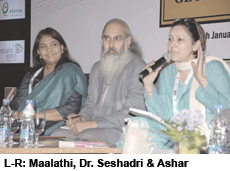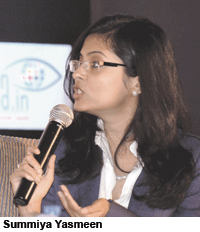Panel Discussion: ‘Dangers of age-inappropriate ECE’
At the EducationWorld ECE Global Conference 2013, a panel discussion convened to discuss the dangers of age-inappropriate ECE, drew a packed house. The panel chaired by Summiya Yasmeen (SY), managing editor of EducationWorld, included Dr. K.R. Maalathi (KRM), a Chennai-based education consultant and advisor to the Ashok Piramal Group, Mumbai, and Children Welfare Society, Dubai; Dr. Shekhar Seshadri (SS), professor, department of child and adolescent psychiatry, NIMHANS (National Institute of Mental Health and Neurosciences), Bangalore; Lina Ashar (LA), founder-promoter of 56 Kangaroo Kids preschools and 18 Billabong High International schools in 20 cities in India; and Priya Krishnan (PK), founder-CEO of the Bangalore-based VBHC Education Services. Excerpts of the 90-minute panel discussion.
 SY: There are an estimated 220,000 private preschools countrywide. But they lack standardised syllabuses and curriculums. Lina, do you agree that most of them are developmentally inappropriate?
SY: There are an estimated 220,000 private preschools countrywide. But they lack standardised syllabuses and curriculums. Lina, do you agree that most of them are developmentally inappropriate?
LA: I don’t want to comment on the curriculums of other schools. In Kangaroo Kids preschools, we pay great attention to delivering age-appropriate ECE. But more than age-appropriate curriculums, there is a great need to upgrade the country’s teacher training institutions and extend their coverage to include ECE. All over the developed world, four years of higher education is mandatory for preschool teachers. Here teacher training colleges offer a one-year programme with some certifying them after three months, which is clearly inadequate.
SY: Maalathi, preschool teachers say parental pressure is forcing them to teach literacy and numeracy to very young children. What’s your comment?
KRM: Professional ECE educators won’t dream of imposing age-inappropriate literacy and numeracy education in preschools. But parental pressure often determines their curriculums. Ignorant parents anxious to give their children an early start, influence private preschool promoters to impose age-inappropriate early learning curriculums which damage, rather than develop little children. And this is happening because of increasing privatisation and commercialisation of ECE.
SY: Dr. Seshadri, what do you think is the psychological and emotional fallout of forcing age-inappropriate learning in early childhood?
SS: Our research on development methodologies suggests that too much is being taught too soon in preschools in India. Parents and ECE teachers must understand that information is not knowledge. There’s no point in loading little children with information as it will fast disappear from their reverberatory circuits and conversion won’t happen. Both these communities must understand — or be made to understand — that the basic objective of ECE is to teach little children to learn how to learn.
Teaching too much too soon makes children believe there is a certain expectation of outcomes. Great expectations and over emphasis on right answers feed fear and anxiety.
 SY: Most preschool promoters say the reason why they begin to teach too much too early is because parents are anxious about preschools preparing children for admission into top primary schools. And whether we like it or not, most primary schools have admission tests and interviews. Priya, what’s your comment?
SY: Most preschool promoters say the reason why they begin to teach too much too early is because parents are anxious about preschools preparing children for admission into top primary schools. And whether we like it or not, most primary schools have admission tests and interviews. Priya, what’s your comment?
PK: Yes there is constant pressure from parents who have a wish list of primary-secondary schools into which they want their children admitted. Therefore we assume the burden of educating parents about RTE Act guidelines to enable them to challenge such schools. In the schools that we run, we had huge resistance from parents who were far from convinced about the value of book-less learning in ECE. This forced us to conduct parental workshops which persuaded them that actual learning does indeed take place in our preschools.
With reference to KRM’s comment on growing private participation in ECE, I believe private participation brings more accountability and parents progressively witness a visible change in their children. Therefore greater private investment in ECE prompts innovation into pedagogical aspects and sets benchmarks for others to follow. Universalisation of ECE shouldn’t be seen as a public vs. private contest. There should be greater private and public investment in early childhood education.
LA: Rather than testing kids or parents for primary school admission which is prohibited by law, we do a vision match instead and admit children whose parents buy into the philosophy of our schools right from the beginning.
SY: Do Indian parents have a tendency to deny children child-centric pedagogies? What is the general expectation of ECE?
SS: Too often ECE is regarded as a business choice or investment for future stability of children. In the process a child’s personhood, sensibilities, or individuality is not addressed. Unfortunately, our entire education system has been perverted and subverted to self-serve an educational nexus and agenda. All the lofty principles which used to drive education have fallen by the wayside and replaced by mushrooming of cram centres, including preschools.
KRM: The problem is that playschools are mushrooming alarmingly in 200-300 sq. ft of spaces where no real play happens at all. Great damage is being done, necessitating strong regulation.
LA: But you should bear in mind that regulation — especially government regulation — is a double-edged sword.
SY: Is there a case for having a body to set standards which schools could use and adopt?
PK: I agree with Lina that government regulation is a double-edged sword. Self-regulation as suggested in the earlier panel would be ideal. But at some point government intervention will be required to control quality across the board. However I am not against 200 sq. ft playschools since they are servicing a need. At the end of the day, a child daycare centre allows mothers to go back to work and augment the family’s disposable income. The question is, how to bring about uniformity into ECE instead of rejecting them completely.
SY: How relevant do you think is the draft ECE curriculum framework of the Union ministry of women and child development?
SS: It’s a star initiative. But between the debate on state regulation, teacher training as a focus, self-regulation as a culture, and a new government frame-work, we need to be aware that the world over, global standards have been set on the basis of experiential pedagogies to improve learning outcomes.
SY: To conclude, the panel agrees that learning too much too early is dangerous and that ECE programmes need to be determined by children’s developmental and contextual needs, providing for more need-based inputs and an enabling environment. And that self-regulation through a body such as the Early Childhood Association is the best way to set standards as well as check dispensation of age-inappropriate early childhood education.















Add comment